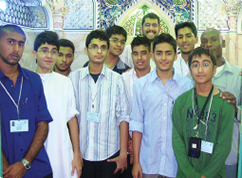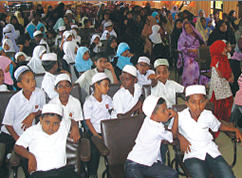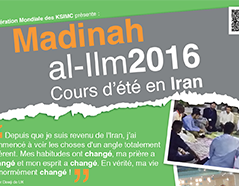This year, although we will not be going to a mosque to perform the Eid al-Fitr prayer, we should still try to perform it home as it is a recommended act of worship for the day. Click here to find out how.
In a few lines - please give a brief overview about yourself, where you are from/born and where were you raised, what age you came to Qum etc.
My name is Muhammad Husein Daya and I’m 16 years old. I was born in Dubai and lived in Tanzania for the first few years of my life. We then moved to Qom when I was 4 and I have been living there ever since. I'm currently in my last year of high school.
1.What age did you start this programme and what/who prompted you to do so?
Answer: I think this goes back to before I was even born. My mother had spent some time with the young Qur'anic miracle Syed Muhammad Husein Tabatabai and his mother. This inspired her to pray for a child who would be hafidh. I was born about a year later and learnt to read the Qur'an at an early age. By the age of 5, I had finished one khatm of the Qur'an and began memorization of the 30th Juz'.
I did this very gradually with the help of my mother and elder sister, spending just a few minutes a few times daily so I wasn't pressured and in fact, spent most of my day playing. However, after I completed this Juz, my mother felt I wasn't ready or interested in memorizing new Surahs so she didn’t force me to continue. Instead, I just continued practicing what I had already learnt [Juz 30] as well as improving my tune, tajweed and getting familiar with the meanings of Qur'anic words.
When I was about 13, I came across this quote of Ayatullah Khamenei (hafidhahullah): "I believe that memorization of the Qur'an should start from childhood; that means about 12-13 years. Learning in childhood is like engraving on a stone".
This inspired me to join an institute for Hifdh of the Holy Quran. So in actual fact, it was a tawfiq from Allah that helped me in this direction and I wasn't pressured by anyone to become a Hafidh.
I decided to take up a three year program which would allow me to simultaneously continue my secular school studies. So I had a one-hour Quran class every day, 5 days a week, and Alhamdulillah, managed to finish memorizing the whole Quran in 3 years (at age 16).
Among the things that motivated me to make this decision were my family’s encouragement and hearing about the numerous spiritual and material benefits of the Holy Quran.
We also had a good Qur'anic atmosphere at home. We had the Qur'an going on at home for several hours each day. Moreover, both my sisters (elder to me by several years) memorized 5 Juz' of the Holy Qur'an even before we moved to Qum. One of them then went on to become a Hafidha.
2. Is this something that is common in the Holy City of Qum, are there many children/adults involved in such activities?
Yes, memorization of the Holy Qur'an is quite popular in Iran and particularly in Qum, and there are many institutes dedicated entirely to the Holy Qur'an: memorization, tajweed, tafseer, specialized recitation, etc. However, the number of adults and children who have actually completed the memorization of the entire Qur'an is limited, and most of these individuals are either Iranian, or from Pakistan or Afghanistan.
3. If it was your parents that sent you to become a haafidh when you were young without having a say, are you grateful that they did so and if yes, why?
My initial experience of memorizing the Qur’an as a child was definitely a result of my parents’ decision and I am very grateful to them for giving me that opportunity. I believed that this initial experience did help me to make the decision to undertake the full memorization course a few years later.
4. Many people would think such a task for a child so young takes away their childhood, what would you say in response to this? Did you have a fun childhood and do things what normal kids would also do e.g. sports, outdoor activites etc
Memorizing the Quran does require dedication and discipline but this does not mean that there is no room for any other activities. A well-managed hifdh plan ensures that a child enjoys the benefits of a fun childhood and games and sports alongside their hifdh schedule. I used to spend one and a half hours daily on the Qur’an and also go to school, but I still had time for extracurricular activities, sports, family trips to different places and so on. A hafidh however, always has to have a little Qur'an with him and make the best use of any spare time anywhere.
5. Can you give us an idea of what a typical day of yours would be like when you were learning the Holy Qur'an and how many hours would you need to put in? Is this something very difficult or do you think its because we dont manage our time well so we think we dont have enough time?
A typical day for me would begin at fajr with Salaah, going to school at 7 a.m. and returning at 3 p.m. From 5-6 p.m. I had my Quran class - then I would come home, pray, eat dinner, rest a bit, study and go to bed. Usually before sleeping I used to memorize the hifdh for the next day which would take about 20 minutes.
6. Was it a challenge to memorise the whole Qur'an - can you give us an insight as to the techniques you used?
Memorizing the holy Qur’an is a huge task for sure and a hafidh is faced with many challenges throughout his journey: feeling daunted by all the pages left to memorize, difficulty in maintaining a disciplined routine, keeping up revision and tackling difficult verses, especially those that cause confusion due to their similarity with other verses.
There are many techniques and methods that can make the process easier, however. First and foremost is seeking help from God and the Ahlulbayt a.s, which is very instrumental. Then there is the importance of having a disciplined routine for memorization, having a hifdh partner or a teacher who can keep a check on your memorization. One of the advantages I had was having a sibling who is also a hafidh. That helped me a lot.
It is also important to focus on quality rather than quantity. It doesn't matter how long it takes to finish, but rather how good the quality of the memorization is. I used to memorize only half a page a day during the school year, and during the summer holidays I’d increase it to one page daily.
Apart from this, if there is one fundamental principle for hifdh, it is revision. If you slack on this, it’s very easy to forget what you’ve previously memorized and may have to begin all over again.
A tip to help with revision, especially when it entails reciting several juz’ a day, is to recite the parts you know really well whilst doing other things, like waiting in a queue or cleaning your room. This can make your routine more efficient as it decreases the amount of time you actually have to sit down with the Qur’an in front of you.
As an example, now that I have finished memorizing the Quran, I currently recite 4 juz' every day just while going and coming back from school and doing other daily duties.
7. The Ahlulbayt a.s were the practical implementers of the Holy Qur'an, do you think after having such a close affiliation with the Holy Qur'an you have become spiritually closer to Allah swt and the Holy Ahlulbayt a.s?
Memorizing the Qur'an has definitely helped me get
closer to Allah, the Ahlulbayt a.s and the Qur'an itself. In order to memorize well, we have to understand the meanings of the words and verses and so at times, when i'm trying to make a decision, I remember verses of the Qur'an that help me to make the right decision. Or even when I think over something I've already done, some verses come to mind and I can evaluate my acts according to those verses.
Moreover, having to keep a routine and give time to the Qur'an also meant that I wasn't wasting much time on gadgets, accessing the internet or going out with friends to just 'hang out' and so on and this itself helped maintain purity and spirituality in thought and action.
8. Is there a distinct memory you have during this time period that stands out e.g. a teacher you had that inspired you, a sura or an ayah that really moved you etc
One of my best hifdh teachers was a real inspiration for me. He started memorizing the Holy Qur'an after the age of 40 and is an excellent hafidh. He can even tell the number of each verse and recites/revises 4 Juz' per day which seemed like a lot to me at that time. He really inspired me to believe that nothing is impossible.
9. Now that you are a Hafidh of the whole Qur'an, how much time do you have to put in to maintain this amazing achievement?
I usually put in one and a half hours a day but not sitting down for that long with the Qur'an. The benefit of having the Qur'an in your mind is that you are able to go over it wherever you are. However, there are many more steps to this journey and time has to be given to tafsir, specialized recitation (like a Qaari) and so on.
10. Has this time not affected your academic studies? Are you struggling in school compared to other children or has it in fact helped you excel in your secular studies?
Memorizing the Quran has in fact greatly improved my studying abilities. Since I began memorizing the Quran, understanding the lessons has become much easier, studying takes lesser time and I am able to score top marks in all subjects Alhamdulillah. So I can tell you out of personal experience that memorizing the Holy Quran improves the memory and actually helps you with other studies.
11. Would you advise other children to start at the same age as you did and if so then why?
I believe the best age to memorize the Quran is 13 or 14, around the same age I started, as this is an age when children usually have free time, excellent memories and also the ability to memorize more independently and maintain a disciplined routine, unlike very young children. There is a special value to learning the Qur'an at this age.
Imam Ja’far as-Sadiq (peace be upon him) has said: "If a youth among believers recites the Holy Qur'an, it gets mixed in his flesh and blood. The Almighty Allah would keep him with virtuous and honored angels and the Holy Qur'an would act as a shield against the fire of hell for him on the Day of Judgment".
12. Many adults after the age of university for example think that becoming a haafidh is practically impossible, would you agree and if not, what would you advise them to do practically so they can at least start memorising parts of the Quran if not the whole of it
It is never too late to get closer to the Quran and memorizing it is a great way to achieve this closeness. Ayatullah Khui (r.a) began memorizing the Quran at the old age of seventy! And he completed it before he passed away. And as I mentioned earlier, one of my best teachers who is an excellent hafidh memorized the Quran after the age of forty. So even though memorizing at an older age may be more challenging, it is definitely worth trying to do at least part of the Qur’an or a few surahs for the countless benefits that it has. Once again, one of the main tips is consistency and going slow but steady, and, of course, beseeching Allah and the Ahlulbayt a.s for success.
I would like to end with a quote from Ayatullah Bahjat r.a. He said: "We should memorize the Qur'an so that it should always be with us and we should always be with it. We should take refuge in the Qur'an and make it a protection for ourselves during the trials and difficulties of this world."
May Allah SWT give us all the tawfeeq to get closer to the Holy Qur'an and make it a part of our lives.
Related News
A delegation of The World Federation of KSIMC comprising of The World Federation Vice President Al-Hajj Munawer Rattansey, and supporter and donor Al-Hajj Muslim Khoja, visited the Shia community in Bosnia between 22 – 26 May 2013.

OneStopFiqh is a new online all in one website for the community to understand all things religious in subjects like Islamic Laws, A Code of Practice for Muslims living in the West, Hajj Rituals, KhumsL A brief Guide, Ask An Alim, and Islamic Dues. Click here to find out more.











